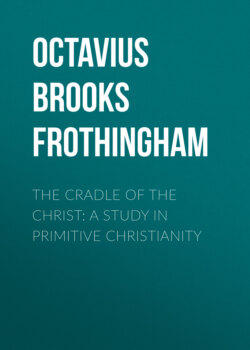The Cradle of the Christ: A Study in Primitive Christianity

Реклама. ООО «ЛитРес», ИНН: 7719571260.
Оглавление
Octavius Brooks Frothingham. The Cradle of the Christ: A Study in Primitive Christianity
The Cradle of the Christ: A Study in Primitive Christianity
Table of Contents
PREFACE
I
FALSE POSITION OF THE NEW TESTAMENT
II
THE MESSIAH
III
THE SECTS
IV
THE MESSIAH IN THE NEW TESTAMENT
V
THE FIRST CHRISTIANS
VI
PAUL'S NEW DEPARTURE
VII
THE LAST GOSPEL
VIII
THE WESTERN CHURCH
IX
JESUS
AUTHORITIES
WASHINGTON IRVING'S WORKS
RECENT PUBLICATIONS OF G. P. PUTNAM'S SONS
A SELECTION FROM STANDARD PUBLICATIONS
VALUABLE BOOKS PUBLISHED BY G. P. PUTNAM'S SONS
BOOKS BY OCTAVIUS B. FROTHINGHAM
Отрывок из книги
Octavius Brooks Frothingham
Published by Good Press, 2019
.....
The period of the captivity in Babylon, which is commonly regarded as a period of sadness and desolation, a blank space of interruption in the nation's life, was, in reality, a period of intense mental activity; probably the highest spiritual moment in the history of the people. Dispossessed of their own territory, relieved of the burden and freed from the distraction of politics, their disintegrating tribal feuds terminated by foreign conquest, living, as unoppressed exiles, in one of the world's greatest cities, with opportunities for observation and reflection never enjoyed before, having unbroken leisure in the midst of material and intellectual opulence, the true children of Israel devoted themselves to the task of rebuilding spiritually the state that had been politically overthrown. The writings that reflect this period, particularly the later portions of Isaiah, exhibit the soul of the nation in proud resistance against the unbelief, the disloyalty, the worldliness, that were demoralizing the less noble part of their countrymen. The duty was laid on them to support the national character, revive the national faith, restore the national courage, and rebuild the national purpose. To this end they collected the traditions of past glory, gathered up the fragments of legend and song, reanimated the souls of their heroes and saints, developed ideas that existed only in germ, arranged narratives and legislation, and constructed an ideal state. There is reason to believe that the real genius of the people was first called into full exercise, and put on its career of development at this time; that Babylon was a forcing nursery, not a prison cell; creating instead of stifling a nation. The astonishing outburst of intellectual and moral energy that accompanied the return from the Babylonish captivity attests the spiritual activity of that "mysterious and momentous" time. When the hour of deliverance struck, the company of defeated, disheartened, crushed, to all seeming, "reckless, lawless, godless" exiles came forth "transformed into a band of puritans." The books that remain from those generations, Daniel, the Maccabees, Esdras, are charged with an impetuous eloquence and a frenzied zeal.
The Talmud, that vast treasury of speculation on divine things, had its origin about this period. Recent researches into that wilderness of thought reveal wonders and beauties that were never till recently divulged. The deepest insights, the most bewildering fancies, exist there side by side. The intellectual powers of a race exhausted themselves in efforts to penetrate the mysteries of faith. The fragments of national literature that had been rescued from oblivion, were pondered over, scrutinized, arranged, classified, with a superstitious veneration that would not be satisfied till all the possibilities of interpretation had been tried. The command to "search the scriptures" for in them were the words of eternal life, was accepted and faithfully obeyed. "The Talmud" says Emanuel Deutsch, "is more than a book of laws, it is a microcosm, embracing, even as does the Bible, heaven and earth. It is as if all the prose and poetry, the science, the faith and speculation of the old world were, though only in faint reflections, bound up in it in nuce." The theme of discussion, conjecture, speculation, allegory was, from first to last, the same—the relation between Jehovah and his people, the nature and conditions of salvation, the purport of the law, the bearing of the promises. The entire field of investigation was open, reaching all the way from the number of words in the Bible to the secret of infinite being. No passage was left unexposed with all the keenness that faith aided by culture could supply; and when reason reached the end of its tether, fancy took up the work and threaded with unwearied industry the mazes of allegory.
.....